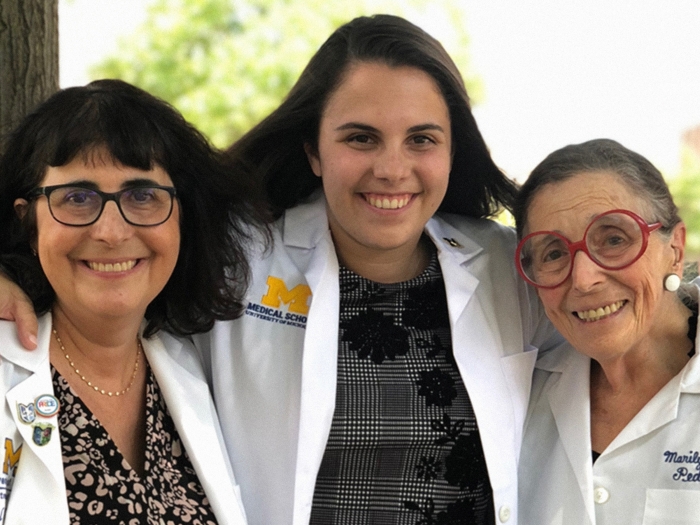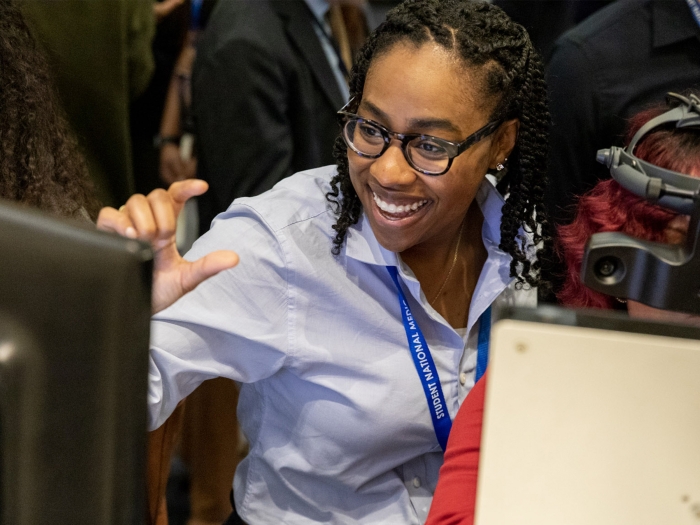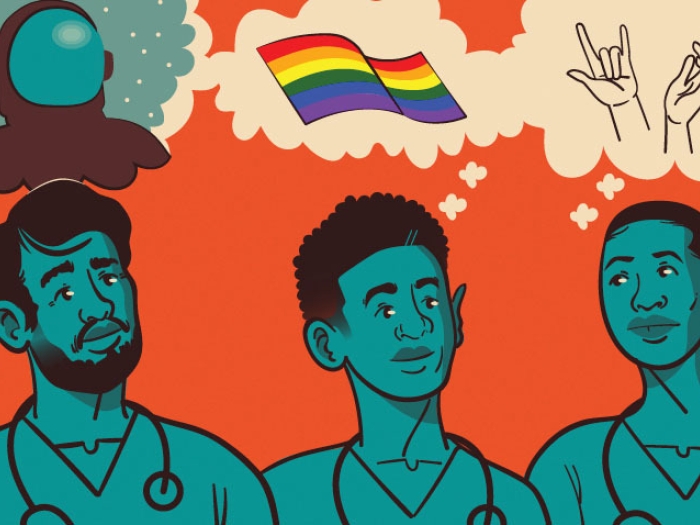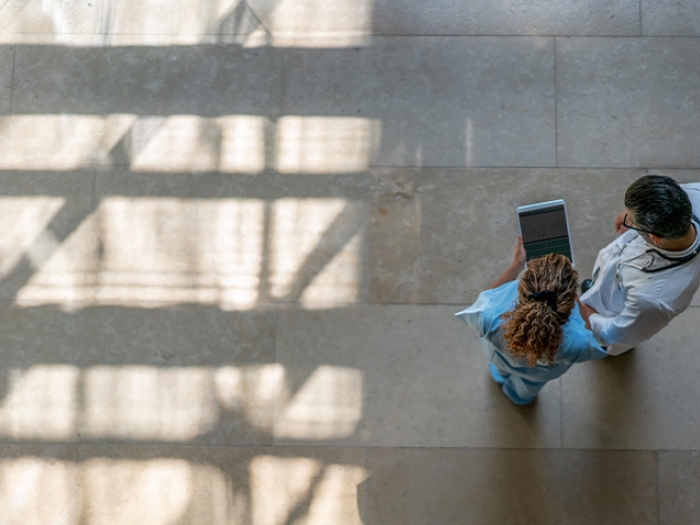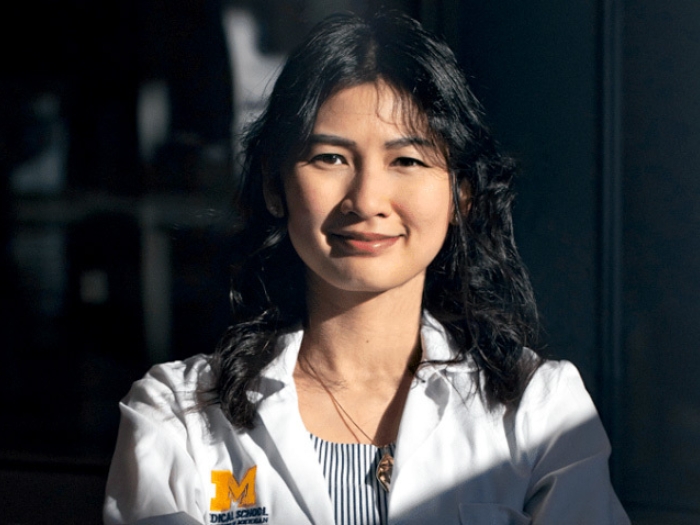Rana Awdish, M.D., says connection should lead the way in their future work
5:00 AM
Author |

University of Michigan alumnus Rana Awdish, M.D., will provide the University of Michigan Medical School commencement speech on May 11 at Hill Auditorium.
Not only is Rana Awdish, M.D., a gifted and beloved physician, but she’s also a steadfast advocate for compassion.
As the director of the Pulmonary Hypertension Program and the medical director of Care Experience at Henry Ford Health, Awdish’s most important role is connecting with students and trainees. Through her work, Awdish has established, and integrates, compassionate communication strategies and narrative medicine practices within the Henry Ford Health curriculum.
“I’m very passionate about this as a healing practice in medicine,” Adwish explained, who has been a guest lecturer for several different courses at U-M in the graduate school and medical school.
Awdish, also a critically acclaimed author who has written extensively about her own critical illness, as well as her role as a healer, knows from firsthand experience how connection can alter a patient-doctor experience.
“When I was a child, my pediatrician saved my infant brother’s life. He had a disease that is now preventable by simply getting a vaccine, but at that time, there was no vaccine. His airway closed and he was gasping for air,” explained Adwish.
She says she distinctly remembers the connection between the her mother and the doctor, and how it inspired her future career.
“My mother explained the situation to our pediatrician, and she was clearly very worried. When I heard our pediatrician translate her words into a diagnosis, the whole thing struck me as magic; having the knowledge to take someone’s words and offer a diagnosis and treatment that will help heal became all I ever wanted to do.”
Awdish went on to complete her medical training at Mount Sinai Beth Israel in New York City and attended Wayne State University Medical School. She attended the University of Michigan for her undergraduate studies and is now a board-certified physician in internal medicine, pulmonary and critical care medicine.
Here, Awdish shares insights for soon-to-be medical school graduates as they grow in the field of medicine.
As someone who works directly with residents, what is the most important thing you impart on them?
One important aspect, when we think about improving care for our patients, is focusing on the people providing the care and ensuring they have the tools they need to do the work in a meaningful way. I think that it’s important to ensure that physicians have the deepest connections they can with their patients and really find joy in their work.
It’s easy to get lost in the busyness of medicine, but if there’s a rooted connection to the people we are serving, our work is much more likely to nourish us.
Of course, this can take several different forms, but we teach C.L.E.A.R. communication to all of our incoming trainees. This form of communication, which stands for connect, listen, empathize, align and respect, serves as the foundation for our new doctors [at Henry Ford Health] and how they interact with their patients.
What advice would you give graduating medical students?
This has been a difficult few years for individuals who were trying to learn medicine throughout an unprecedented respiratory pandemic. It has also been a difficult few years for the field of medicine, overall. The ability to navigate a changing world during uncertain times where we truly lacked control is a lesson that all of us will carry forward for the rest of our lives
Our aspiring physicians have learned how to navigate uncertainty with both grace and grit, and this makes me feel so confident about the future of medicine. Partly because of this pressure on health care during this time, we are now seeing a different type of doctor emerge: one that understands the need for science communication to the public and one that understands advocacy, as well as the role of public health.
This shift makes so many more things available.
What is the key to creating, and bettering, connections between yourself and patients?
When I became critically ill at the end of my critical care fellowship, I was cared for in the intensive care unit for several months. This gave me a completely different vantage point regarding what my patients need from me in order to have a healing relationship.
I realized that I had been so focused on the medicine, science and treatment sides of it all, that I didn’t allow enough space for connection. But now I take the time to recognize and honor each patient as an individual with loved ones and a whole world outside of their condition.
As physicians, if we don’t allow ourselves to be in a relationship with our patients and to fully know them, as well as the hard parts of their journeys, we’re depriving ourselves of the richest parts of medicine. To me that’s sacred, and no one can protect that space except for us.
How would you advise students design and follow their “own” paths?
One of the most important things that I’ve had to learn throughout my career in medicine is how to attune my internal environment so that I can be honest about the things that genuinely bring me joy and fulfillment. In doing so, I’ve realized that the things that bring me joy are often different than what others think should make me happy.
To create a career that is yours, you need to be reflective and honest. You may find that the moment in your day that actually lights you up might be very different than what you’re told should light you up.
For example, it might be a difficult procedure, or a hard conversation with a patient’s family or a small interaction with a trusted colleague. Through that process of attunement and reflection, you can really build a career that’s yours and not anyone else’s.

Explore a variety of health care news & stories by visiting the Health Lab home page for more articles.

Department of Communication at Michigan Medicine
Want top health & research news weekly? Sign up for Health Lab’s newsletters today!
